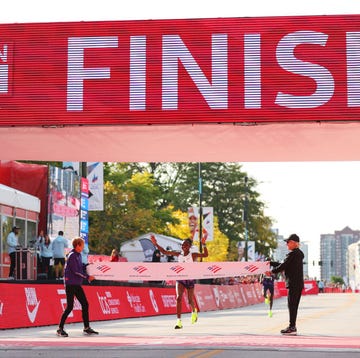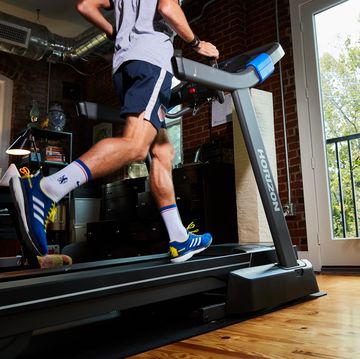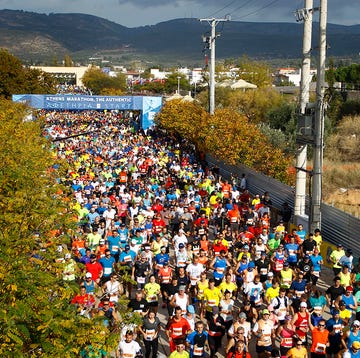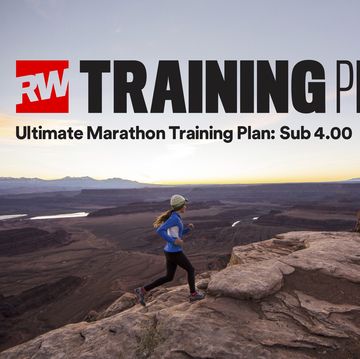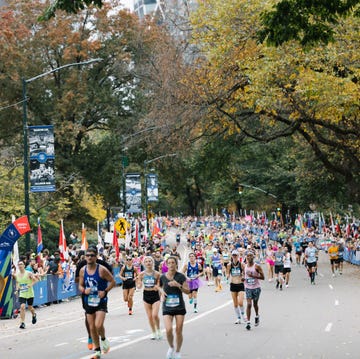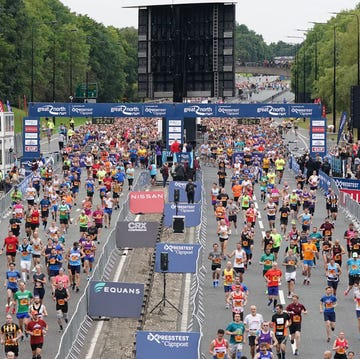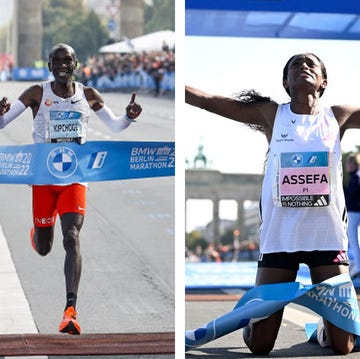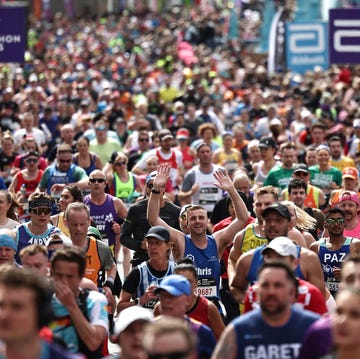Steve has run more than 60 marathons, holds a PB of 2:29, and has also won a British marathon title in his age group.
This is his 35th successive year of preparing for a marathon and for the last five years, he's run a series of consistent times at the London Marathon (2:46, 2:43, 2:46, 2:43 [his quickest in last 20 years] and 2:47). Over the years, he estimates he's run about 2,000 races.
Q. How important is it for a first timer to have a goal pace and be aware of splits etc
Q. Most marathon schedules are based on past performances but my opinion is that you should train to improve your time. How can I work out what a realistic target should be? achingcalves
A. If you have run a marathon before then that should give you a good starting point and by running races over shorter distances you should get an idea of what is realistic. Most importantly though, your target should be flexible. If you start to see improvements in shorter races you can move your target forward - conversely, if you get injured or just can't train as hard as you were hoping, then you can move the target back. I'd suggest reviewing your progress each week and setting secondary targets (either faster or slower) depending on where you are in relation to your original goal.
The best speed session for optimal recovery? Wobbled
A. The most important thing for your first marathon is to enjoy it. Until you run the distance, there's no way of knowing what you are capable of - most people aim far too high based on their half-marathon time and then struggle to maintain their pace after 20 miles.
Q. What's the most important quality session of the week (after the long run) for a 6 - 7 min/mile marathon runner? Jokerman
A. I think the most important session is an interval session (400m, 800m, mile etc). It can lead to the biggest improvements in your speed endurance and causes a knock-on effect at all distances from 5K to marathon. Use the session to hit a range of paces - for example, in a session of mile reps, run some parts nearer to marathon or half-marathon pace, even if you run the majority at 10K pace. A marathon runner needs to train at marathon pace as well - you can't just rely on the faster sessions.
Read the whole forum debate? The Evil Pixie
A. The more speedwork you do, the faster you will get. Apart from running quicker times at shorter distances (which will give you a psychological boost), the sessions will also help you feel more comfortable running at a slower pace for a marathon.
Q. I missed a two-month training period earlier in the year and now find I'm lacking aerobic capacity. Should I abandon speed and tempo sessions (and replace them with steady runs) or is there still merit in keeping the faster sessions in? FerrousFerret
A. I would still recommend the faster sessions but rein in your speed a little and take them slightly easier. That way, you should be able to improve your aerobic capacity and speed gradually (rather than doing lots of slow running and starting from scratch with the faster stuff). As long as your speed sessions and tempo runs are quicker than your long runs then they will be doing you good.
Q. I'm starting to worry my base fitness is lacking - is there anything other than running I can do to increase my core fitness? NorwichRunner
A. The most important thing about a running schedule is always the running. That said, you could try devoting one day a week to a gym session.
In about 30 minutes, I can usually fit in 10 minutes of stretching (and some core exercises), 15 minutes of weights and 5 minutes of rowing. The latter is a great all-round workout - I feel a few 500m intervals (with a minute's recovery) really help my overall fitness and strength.
Gym sessions for marathoners don't have to be drawn-out affairs involving lots of weights - dynamic stretches are great for keeping supple and warmed up.
Q. I always seem to end up missing one of my easy runs each week due to exhaustion - what impact will this have on my race performance? Ehine
A. As long as you do the main sessions, missing the easy ones won't matter. Sometimes your body just takes a while to adapt to the training and you might find it gets easier. Of course, sometimes you just get more tired!
Q. Do you specifically train at your lactate threshold or would you consider a weekly race a high threshold run? Jokerman
A. Lactate threshold sessions are vital whether you race regularly (when you tend to go over the threshold) or not. In an ideal world, you should aim to run a good 30-45 minutes at around half-marathon pace once every two weeks. The key to a good marathon is feeling comfortable for as long as possible into the race - regular racing or threshold runs enable you to cruise at a slightly faster pace without getting tired too early.
Q. I'm practising with gels and sports drinks during my long, slow runs and definitely find they give me a boost. I don't want to over-rely on them though - how many gels would you recommend and when would you take them? Veester
A. Personally, I think my consistency and relatively strong race finishes are due to a mix of sensible fuelling, good pacing and solid training. I take five gels on marathon day - one in my porridge at breakfast, one at the start, one after 10K, and then two more at Miles 15 and 20 (which I think give me the biggest boost though some of it may be psychological). Before using gels, I would hit the wall more regularly and end up shuffling for the last few miles - in recent years, I've felt as though I've been racing and even overtaking people in the last six miles rather than just hanging on.
Q. I understand that 'time on feet' will help me prepare my endurance base for running a sub-4:00 marathon but if all my long runs are at 10-minute-mile pace, how will I be able to run 9-minute miles on the day? Iron Rach
A. You will need to do some work at (or faster than) marathon pace in preparation for race day, but this need only be a small percentage. When it comes to the marathon, you will be well rested and will have the incentive (and adrenalin) of the sense of occasion.
Running at marathon pace for a full marathon takes an awful lot out of you - most runners can only manage two marathons a year - so if you do too much marathon-pace work in training, it can actually undermine your fitness rather than add to it.
That said, do try and run some races or faster sessions as part of your preparation so your body isn't taken by surprise on marathon day.
Q. Have you found it harder to maintain the same level of fitness as you get older? Have you changed the way you train or diet? Knight rider
A. My speed has deteriorated but in terms of marathon running, my fuel strategy is better, my pacing is good and I know what works for me in training. I take slightly longer to recover from hard sessions and do slightly less mileage but try not compromise too much - one of the reasons runners do slow down is because they ease off the training.
At my club, two runners set PBs and won national titles aged 55 - they started late but still trained hard. Most runners reach their peak five to seven years after they start hard training whether they're 20 or 50.
Don't miss our next live forum debate - part of a series in our 2010 Virgin London Marathon build-up. On Friday March 5, we'll be welcoming Paul Evans, former Chicago Marathon winner - and another Q. Why do I need to do speedwork if my goal is sub-5:00 mentor - onto the forums between 1pm and 2pm to answer more of your marathon training questions. Pop the date in your diary now!


